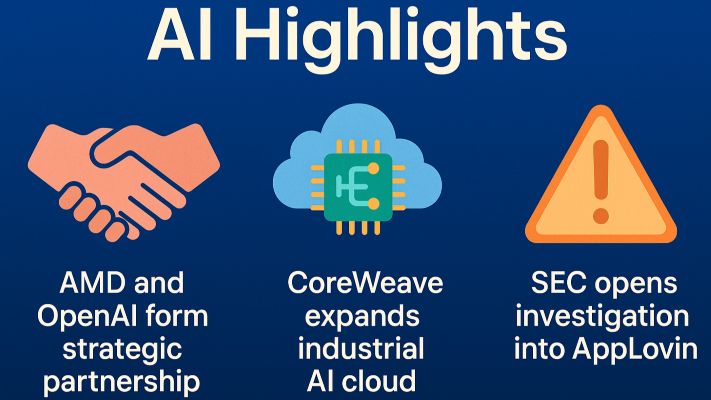AI Navigation
- articleAI Trends
- lightbulb_2AI Tips
- assistant_navigationAI Navigation
- heatHot Articles
- emergency_heat_2Hot Tips
- format_list_numberedPrompt Formatter
- psychologyTest Center(RPI)
October 7, 2025 · 24-Hour AI Briefing: AMD Joins Forces with OpenAI, CoreWeave Expands into Industrial AI, and AppLovin Faces SEC Probe
The global AI race intensified over the past 24 hours.
OpenAI officially partnered with AMD in a historic multi-gigawatt GPU deal, CoreWeave made a strategic move into industrial AI through acquisition, and AppLovin came under U.S. regulatory scrutiny.

1. AMD and OpenAI Announce Strategic Partnership to Deploy 6 GW of AI GPUs
AMD and OpenAI have announced a long-term, multi-generational partnership to deploy 6 gigawatts (GW) of AMD GPUs.
OpenAI will begin with the rollout of 1 GW of AMD Instinct™ MI450 GPUs (based on the CDNA 4 architecture) in the second half of 2026, expanding to 6 GW in total over several phases.
As part of the deal, AMD has granted OpenAI up to 160 million AMD common stock warrants, which will vest upon reaching specific performance and deployment milestones.
Comment:
This marks a pivotal win for AMD in the AI chip race. The MI450 series rivals Nvidia’s Blackwell in performance and scalability.
For OpenAI, the partnership diversifies its GPU sources, reducing overreliance on Nvidia’s H100/H200 line—particularly vital amid the 2025 surge in global compute demand.
A 6 GW cluster roughly translates to 600,000–700,000 high-end GPUs, representing a multi-billion-dollar contract.
The equity-linked structure aligns AMD’s success directly with OpenAI’s growth, positioning AMD not just as a hardware supplier but as a strategic stakeholder in the AI ecosystem.
If successful, this collaboration could encourage other AI firms like Anthropic, Mistral, and xAI to follow suit—potentially reshaping the AI infrastructure market.
2. CoreWeave Acquires Monolith, Expands AI Cloud into Industrial Engineering
CoreWeave has acquired Monolith, an AI/ML engineering firm specializing in physics-based modeling and simulation, aiming to extend its AI cloud platform into manufacturing, automotive, and aerospace sectors.
The acquisition enhances CoreWeave’s ability to offer end-to-end industrial solutions powered by GPU-based compute.
Comment:
This move signals CoreWeave’s transition from a general-purpose AI cloud provider to an industrial AI powerhouse.
By combining Monolith’s domain expertise in engineering simulation with CoreWeave’s GPU infrastructure, the company is building an integrated AI + HPC + Engineering Simulation platform—targeting the trillion-dollar industrial innovation market.
As Nvidia’s key GB300 cluster partner, CoreWeave is evolving from a pure compute vendor into an AI ecosystem enabler, mirroring the trajectory of OpenAI in the software domain.
3. AppLovin Faces SEC Investigation Over Data Collection Practices
The U.S. Securities and Exchange Commission (SEC) has launched an investigation into AppLovin’s data collection practices on its AppLovin Exchange (ALX) platform.
The probe reportedly stems from whistleblower complaints and a short-seller report from Spruce Point Capital, which alleged potential privacy law violations.
Following the news, AppLovin’s stock dropped more than 14% in late trading.
Comment:
AppLovin’s core competitive edge lies in its massive behavioral data ecosystem—ironically, the same area now drawing regulatory scrutiny.
While the company called the allegations “misleading” and confirmed cooperation with regulators, no formal charges have been filed yet.
If the investigation escalates, AppLovin could face collective lawsuits or heavy fines.
In the broader context, this highlights a growing tension between AI-driven advertising innovation and data privacy compliance, an issue that will define the next era of ad-tech evolution.
The AI landscape is shifting from a battle of models to a battle of infrastructure, integration, and regulation.
AMD’s hardware breakthrough, CoreWeave’s industrial pivot, and AppLovin’s compliance challenges each underscore how the next wave of AI progress will be shaped—not only by technology—but by partnerships and governance.
For more AI insights, business analysis, and technology trends, visit:
https://iaiseek.com/en